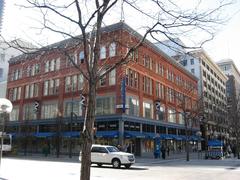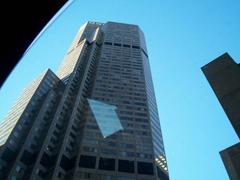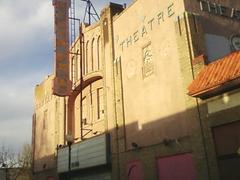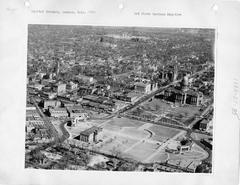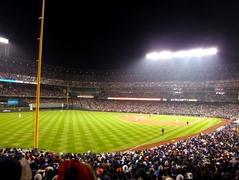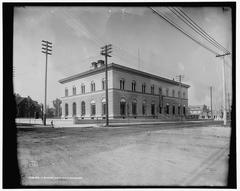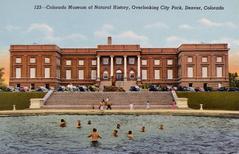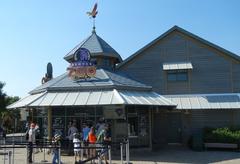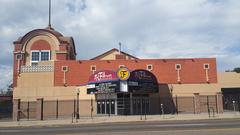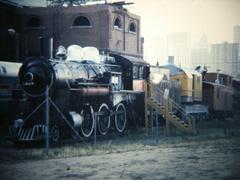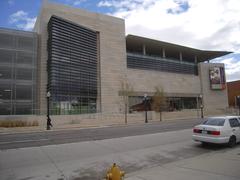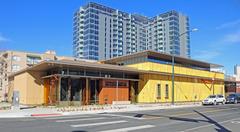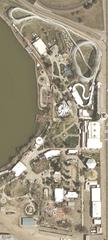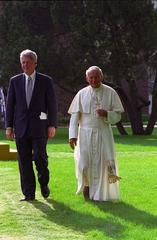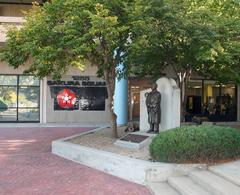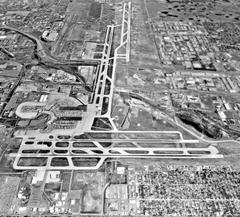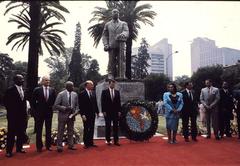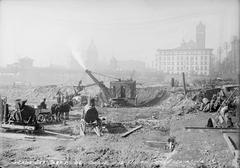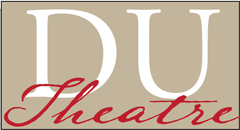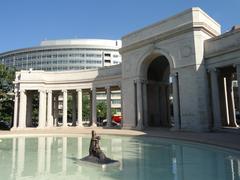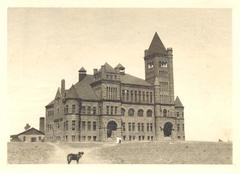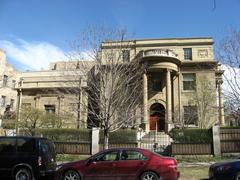Riverfront Park Denver: Visiting Hours, Tickets, History & Travel Guide
Date: 14/06/2025
Introduction
Riverfront Park Denver stands as an inspiring testament to urban transformation, blending Denver’s rich historical roots with contemporary recreational and cultural amenities. Located at the confluence of the South Platte River and Cherry Creek, the park occupies the very site where gold-seekers first camped in 1858—the event that sparked the Colorado Gold Rush and led to Denver’s founding. What was once a neglected industrial rail yard has blossomed, through visionary public-private collaboration, into a vibrant, sustainable urban neighborhood. Today, Riverfront Park offers green spaces, pedestrian and cycling trails, iconic bridges, and a multitude of community events, all within steps of downtown Denver and major transit hubs.
This guide provides comprehensive information for visitors, including park hours, accessibility, transportation, historical context, major attractions, nearby amenities, and practical tips to help you make the most of your visit.
For the latest updates on events, guided tours, and visitor amenities, consult the official Riverfront Denver website, as well as additional resources such as Urban Land Institute case studies and Denver Gazette historical features.
Table of Contents
- Introduction
- Historical Roots: From Gold Rush Encampment to Urban Hub
- Urban Renewal: Vision, Collaboration, and Redevelopment
- Visiting Riverfront Park: Hours, Accessibility & Transportation
- Park Attractions and Key Features
- Events, Guided Tours, and Community Life
- Sustainability and Social Equity
- Nearby Attractions & Dining
- Travel Tips & Visitor Etiquette
- Frequently Asked Questions (FAQ)
- Conclusion & Final Recommendations
- References
Historical Roots: From Gold Rush Encampment to Urban Hub
Riverfront Park sits on land of great historical significance. The confluence of the South Platte River and Cherry Creek was the site of Denver’s first settlement in 1858, when gold-seekers staked their claims and set up camp (denvergazette.com). This pivotal moment launched the Colorado Gold Rush and shaped the city’s early growth and distinctive street grid, which mirrors the river’s path.
By the late 19th century, the area was dominated by rail yards and warehouses, facilitating Denver’s industrial expansion but isolating the riverfront from downtown. For decades, the land was largely neglected and environmentally degraded, its potential as a public amenity unrealized.
Urban Renewal: Vision, Collaboration, and Redevelopment
The transformation of Riverfront Park began in the 1980s and 1990s, as city leaders and private developers sought to reclaim the riverfront for public use and urban living (casestudies.uli.org). The process involved consolidating and remediating contaminated railroad land, assembling 23 acres for a master-planned community, and adopting a form-based zoning code to ensure mixed-use, walkable neighborhoods (designworkshop.com).
Key partners included the City and County of Denver, Trillium Corporation, East West Partners, and Crescent Real Estate Equities. Collaboration with agencies like the Mile High Flood District, The Greenway Foundation, and the U.S. Army Corps of Engineers ensured flood protection, habitat restoration, and sustainable urban design (urbanland.uli.org).
Today, Riverfront Park is renowned for its integration of residential, retail, and recreational spaces, as well as its focus on environmental remediation and social equity (infrastructureusa.org).
Visiting Riverfront Park: Hours, Accessibility & Transportation
- Hours: Open daily from dawn until dusk; some sections (such as adjacent trails) may be accessible from 5:00 AM to 11:00 PM.
- Admission: Free entry; some events or guided tours may require advance registration or fees.
- Accessibility: The park features paved, wheelchair-accessible paths and ramps, accessible restrooms, and step-free connections via bridges.
- Getting There: Riverfront Park is adjacent to Union Station, Denver’s main transit hub, with RTD light rail, buses, and bike-share services. Visitors are encouraged to use public transit or bike/scooter rentals due to limited and often expensive parking (Way.com).
- Parking: Metered street parking ($2/hr), public lots ($3–$12/day), and overnight metered options are available. Free metered parking on Sundays and holidays; vehicles with disability placards park free at meters for up to four hours.
Park Attractions and Key Features
Commons Park
A sprawling 25-acre green space at the heart of Riverfront Park, Commons Park features open lawns, tree-lined walking paths, and panoramic views of downtown Denver. It’s perfect for picnics, sports, and community gatherings.
South Platte River & Riverside Trails
The South Platte River runs through the park, with multi-use paved trails connecting to Denver’s larger trail network. Enjoy walking, jogging, or cycling along scenic riverfront paths.
Iconic Bridges
- Millennium Bridge: A cable-stayed pedestrian bridge connecting Riverfront Park to LoDo and Union Station, offering skyline vistas.
- 19th Street Bridge: Historic ironwork bridge used for events and pedestrian access.
Denver Skate Park
A 60,000-square-foot riverside skate park offers bowls, ramps, and rails for all skill levels.
Dog Parks
Riverfront Park features one of Denver’s largest off-leash dog parks, complete with shaded seating, water stations, and waste facilities.
REI Flagship Store
Located in a renovated power plant, the REI store serves as an outdoor adventure hub with rentals, an indoor climbing wall, and access to river launches for kayaking.
Art Installations & Public Spaces
Enjoy public art, seasonal exhibitions, and open plazas throughout the park.
Events, Guided Tours, and Community Life
Riverfront Park is a lively hub for community events, including free outdoor concerts, yoga classes, food truck festivals, and seasonal markets (riverfrontparkevents.com). Guided walking and biking tours are available seasonally, offering insights into Denver’s history and riverfront transformation.
Sustainability and Social Equity
Riverfront Park is a national model for sustainable urban infill. The project remediated brownfield sites, restored river habitats, and prioritized pedestrian and bike connectivity. At least 10% of housing units are deed-restricted for affordability, promoting inclusive urban living (designworkshop.com).
Nearby Attractions & Dining
- Union Station: Historic transit hub with shops, bars, and restaurants.
- 16th Street Mall: Pedestrian shopping and dining corridor.
- Coors Field: Major League Baseball stadium nearby.
- LoDo & Highlands: Vibrant neighborhoods with diverse dining and nightlife.
Travel Tips & Visitor Etiquette
- Weather: Denver’s weather is variable; bring layers and sun protection.
- Pets: Dogs must be leashed except in off-leash dog parks.
- Parking: Use public transit, rideshares, or bike/scooter rentals to avoid parking hassles.
- Safety: The park is generally safe, with regular patrols; stay on well-lit paths after dark.
- Respect the Space: Keep the park clean and respect art installations and community events.
Frequently Asked Questions (FAQ)
Q: What are Riverfront Park’s visiting hours?
A: The park is open daily from dawn until dusk (some areas from 5:00 AM to 11:00 PM).
Q: Is there an admission fee?
A: No, entry is free; some events or activities may require tickets.
Q: Is the park wheelchair accessible?
A: Yes, with paved paths and accessible restrooms.
Q: Can I bring my dog?
A: Yes, dogs are welcome; leashes required except in off-leash areas.
Q: Are guided tours available?
A: Yes, check the official event schedule for details.
Q: Where can I park?
A: Metered street parking and public garages are available, but public transit is recommended.
Conclusion & Final Recommendations
Riverfront Park Denver exemplifies successful urban revitalization, combining rich historical context, sustainable design, and dynamic community life. With free daily access, excellent connectivity, and a wealth of amenities—from green spaces and river trails to cultural events and architectural landmarks—it’s a must-visit destination for locals and visitors alike.
For the latest updates, guided tour schedules, and event listings, visit the official Riverfront Denver website and check the event portal. Enhance your visit by downloading the Audiala app for personalized guides and offline maps, and explore related articles on Denver’s historical sites and best urban parks to deepen your experience.
Alt text: Scenic view of Riverfront Park Denver with downtown skyline and South Platte River
Alt text: The iconic Millennium Bridge linking Riverfront Park to downtown Denver
For an interactive experience, try the virtual tour of Riverfront Park Denver.
Related Internal Links:
References
- Exploring River Front Park Denver: History, Visiting Hours, and Attractions, 2025, Denver Gazette (denvergazette.com)
- Riverfront Park Redevelopment Case Study, 2025, Urban Land Institute (casestudies.uli.org)
- Riverfront Park Urban Design and Sustainability, 2025, Design Workshop (designworkshop.com)
- Exploring Riverfront Park Denver: Visiting Hours, Tickets, and Historical Significance, 2025, Infrastructure USA (infrastructureusa.org)
- Riverfront Park Events Schedule, 2025, Riverfront Park Events (riverfrontparkevents.com)
- Denver Parking Guide: Rules and Tips, Way.com (Way.com)
- Delightfully Denver: Things to Do in Denver (Delightfully Denver)
- Travel Pander: Things to Do in Denver (Travel Pander)
- Rocky Mountain Dreaming: 100 Things to Do in Denver (Rocky Mountain Dreaming)
